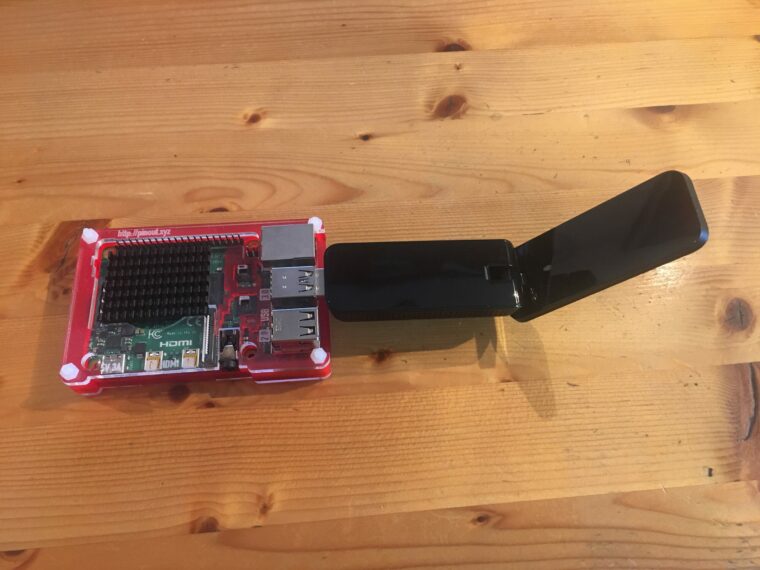If you’re using a Raspberry Pi and need a WiFi USB adapter, it’s important to note that most 2.4 GHz adapters work “out of the box.” However, this is not necessarily the case with 5 GHz WiFi USB adapters. Therefore, this article provides insights into the compatibility of three 5 GHz WiFi USB adapters with Raspberry Pi. We’ll also discuss the availability of driver software and the performance of these adapters based on our long-term observation.
Remark: Since TorBox v.0.4.0, the additional needed network drivers have already been installed on the provided TorBox image. There is also the possibility of (re)installing the drivers using the Update and Maintenance sub-menu, which may be necessary with a Raspberry Pi 5.
We want to focus mainly on the nano-sized adapters because they usually have a lower power consumption. Nevertheless, as an alternative, we tested the AC1300 from TP-Link. It is a modern adapter that is relatively large and has two internal antennas. The tests were performed mainly on a Raspberry Pi 4 Model B. The following adapters were (by chance) available for the test (more adapters may be tested on request – let me know):
- Netgear AC1200, nano-sized USB 2.0 adapter, which supports 802.11 b/g/n (2,4 GHz) and 802.11 a/n/ac (5 GHz)
- TP-Link Archer T2U Nano AC600, nano-sized USB 2.0 adapter, which supports 802.11 b/g/n (2,4 GHz) and 802.11 a/n/ac (5 GHz)
- TP-Link AC1300, USB 3.0 adapter, which supports 802.11 b/g/n (2,4 GHz) and 802.11 a/n/ac (5 GHz), with two antennas and multi-user MIMO technology
The Netgear AC1200
The Netgear AC1200 is not supported “out of the box” by the Raspberry Pi. To make it work, we need to install the Realtek RTL8812BU driver. The installation is straightforward:
# Updating the kernel headers and installing essential tools
sudo apt-get install -y raspberrypi-kernel-headers bc build-essential dkms
# Clone the driver to the Raspberry Pi
git clone https://github.com/morrownr/88x2bu-20210702.git
cd 88x2bu-20210702
# Install the driver
sudo ./install-driver.sh NoPrompt
# Revome the cloned repository
cd
sudo rm -r 88x2bu-20210702
After the driver’s installation and a reboot, the Netgear AC 12000 adapter is discovered by the Raspberry Pi and is ready to use. In the TorBox main menu, using entry 6, we get into Torbox’s Wireless Manager (TWM) and see all available 2,4 GHz and 5 GHz networks. During our test, the adapter lost the connection to the Internet after a few hours. A possible root of the problem could be a too-high power consumption or a too-big accumulation at the USB interface or the adapter. It may be a combination of both factors because both the USB interface of the Raspberry Pi and the adapter are heated a lot during operation. Maybe because of that, we didn’t see any speed advantages: the network performance on the 5 GHz network was not higher than a simple 2,4 GHz USB WiFi adapter.
The TP-Link Archer T2U Nano AC600
Also, the TP-Link Archer T2U Nano AC600 does not work “out of the box”. To make it work, we need to install the Realtek RTL8812au driver. The installation is straight forward:
# Updating the kernel headers and installing essential tools
sudo apt-get install -y raspberrypi-kernel-headers bc build-essential dkms
# Clone the driver to the Raspberry Pi
git clone https://github.com/morrownr/8812au-20210820.git
cd 8812au-20210820
# Install the driver
sudo ./install-driver.sh NoPrompt
# Revome the cloned repository
cd
sudo rm -r 8812au-20210820
After successfully installing the driver and a reboot, the TP-Link Archer T2U Nano AC600 adapter is discovered by the Raspberry Pi and is ready to use. In contrast to the Netgear AC1200, the TP-Link Archer T2U Nano AC600 showed stable operation during the tests. The adapter did not lose connection to the network even during hours of operation. However, the heat development on the USB interface and the adapter was comparable to the Netgear AC1200. It seems that this is a general problem of nano-sized adapters, which have a lack of surface to dissipate heat. Again, no higher network performance than simple 2,4 GHz WiFi USB adapters could be observed.
The TP-Link Archer T4U AC1300
AC1200 (Realtek RTL8812BU), which can be installed as described above. After installing the driver, our surprise was enormous. The TP-Link Archer T4U AC1300 showed higher stability than the Netgear AC1200. The adapter showed stable operation during the tests – at 2.4 GHz and 5 GHz, and even operated with battery power. It did not lose connection to the network even during hours of operation. As expected, connected with a 5GHz network, the TP-Link Archer T4U AC1300 shows a significantly higher network performance. Random influxes cannot be excluded, but when downloading the LibreOffice package, constant data rates could be detected, which were at least twice as high as with the other two adapters or with simple 2,4 GHz USB WiFi adapters. Possibly, the two available antennas with the multi-user MIMO technology will come into play here. Interestingly, the adapter only slightly warms itself and the USB interface, probably due to the significantly larger surface of the adapter and the ventilation holes.

Conclusion
In general, simple, low-powered USB WiFi adapters lead to fewer problems. 5 GHz WiFi USB adapters don’t work “out of the box” with a Raspberry Pi. Searching and installing the necessary network drivers can be challenging. Unfortunately, nano-sized adapters don’t deliver what they promise – it is more or less throwing money out of the window. In contrast, the excellent test results of the TP-Link Archer T4U AC1300 surprised us positively. The purchase of this adapter could be worthwhile because of the availability of the 5 GHz networks and because of the higher throughput due to the multi-user MIMO technology. The TP-Link Archer T2U AC600 also ran reliably, impressed with its stability. Although it opens up the world of 5 GHz networks, higher throughput rates are not to be expected with this adapter. In contrast, the Netgear AC1200 left somewhat mixed feelings. It also allows docking to 5 GHz networks without providing higher throughput rates. However, this adapter makes a much less stable impression in daily use. Regularly, after a few hours, it loses its connection to the network, which is unacceptable. The biggest problem with all these more complex adapters is that they are not supported out of the box by the Raspberry Pi OS.
Update in Spring 2024: I used the TP-Link Archer T4U AC1300 for the last 3,5 years on my TorBox, which I use for daily operations. It is still remarkable how reliable and fast this adapter is working. Although the adapter is still being sold, we will soon test two new WiFi 6 USB adapters.
For more up-to-date information on USB-WiFi under Linux see here.




is there any chance to use the USB WLAN stick for the AP service?
be default the AP is on WLAN0, i want to switch the AP service to WLAN1.
but in the menu i cant find any option for this
Sorry for the delay in answering your question.
The USB stick will be used as an AP with entry 7 in the Main Menu (https://www.torbox.ch/?page_id=775). By default, to prevent a lock-out scenario, this will be reverted with every reboot until you remove this failsafe by using entry 4 in the Danger Zone sub-menu (https://www.torbox.ch/?page_id=3445).
the link on github for the Realtek RTL8812au driver is down. 🙁
https://github.com/morrownr/8812au-20210629.git
They changed the link. New link: https://github.com/morrownr/8812au-20210820
I fixed the files on the TorBox Github repository.
Just update your TorBox menu with entry 5 in the Update and Maintenance sub-menu (https://www.torbox.ch/?page_id=1410).